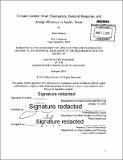Climate control : smart thermostats, demand response, and energy efficiency in Austin, Texas
Author(s)
Bowen, Brian (Brian Richard)
DownloadFull printable version (15.98Mb)
Alternative title
Smart thermostats, demand response, and energy efficiency in Austin, Texas
Other Contributors
Massachusetts Institute of Technology. Department of Urban Studies and Planning.
Advisor
Judith Layzer.
Terms of use
Metadata
Show full item recordAbstract
Energy efficiency and demand response are critical resources for the transition to a cleaner electricity grid. Demand-side management programs can reduce electricity use during peak times when power is scarce and expensive, and they can help to integrate intermittent renewable energy resources by balancing real-time supply and demand for electricity. These programs are more cost-effective than large-scale energy storage technologies and are particularly important in cities and states with strong climate change and energy goals. Since 2000, Austin Energy has managed a residential demand response program that enables it to reduce air conditioning usage by remotely adjusting thermostat settings at tens of thousands of homes. The utility distributed free thermostats to households that participated in this program; however, by 2012, it determined that only one third of them were working as intended. During the summer of 2013, Austin Energy decided to implement a new program utilizing new technology, Wi-Fi connected "smart" thermostats. Instead of providing free thermostats to reduce peak demand, the utility encouraged residents to bring their own device and receive a one-time $85 enrollment incentive. This thesis analyzes these two approaches to residential demand response as measured by program enrollment rates and participant performance during demand response events. In addition, it assesses the smart thermostats' ability to reduce energy consumption (i.e. improve energy efficiency) over the course of the summer. My analysis indicates that smart thermostats were more effective at reducing peak demand than the free thermostats employed in the previous program. However, homes with smart thermostats used more energy for air conditioning over the course of the summer than homes without, indicating limited energy efficiency potential from smart thermostats among the study population.
Description
Thesis: M.C.P., Massachusetts Institute of Technology, Department of Urban Studies and Planning, 2015. Cataloged from PDF version of thesis. Includes bibliographical references (pages 54-61).
Date issued
2015Department
Massachusetts Institute of Technology. Department of Urban Studies and PlanningPublisher
Massachusetts Institute of Technology
Keywords
Urban Studies and Planning.